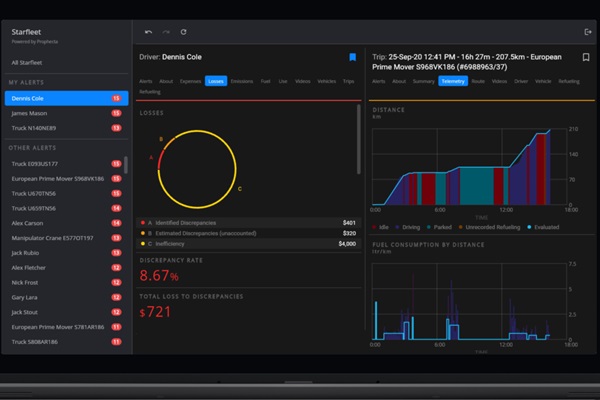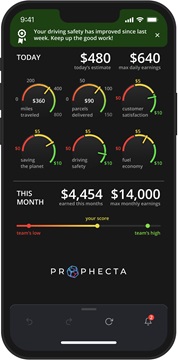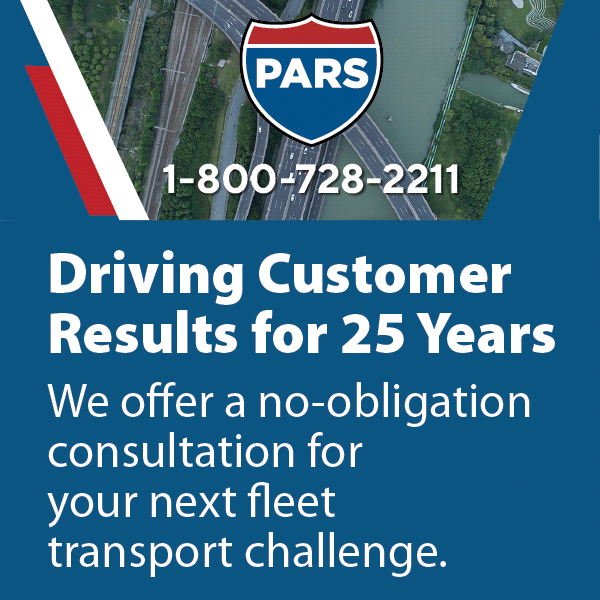
By Fleet Management Weekly Staff
April 17, 2024
Rarely has it proven easy or cheap to become more sustainable in the automotive world.
Most companies spend more to lower their carbon footprint, leading to a tenuous balance between sustainability and profitability. In the truck fleet industry, however, an innovative approach using advanced AI finally ends the cost-to-cut-carbon dilemma by focusing on the driver.
Since its founding in 2022, Silicon Valley-based Prophecta has been developing a new math algorithm that extends the value of telematics-based data used by truck fleets to reduce emissions. Their technology analyzes driver behavior to find and correct inefficiencies, allowing fleet managers to lower fuel consumption by up to 40%. Prophecta’s AI model can enhance the planning of optimal routes and vehicle loading. Truck fleets find that the Prophecta solution contributes to retaining drivers and incentivizes eco-friendly driving.
“We’re an AI company,” says CEO Vasily Nikolaev. “But our thinking about AI is not about replacing people. It’s about empowering and helping people. Our technology allows drivers to be more easily engaged in emissions reduction and gives companies the data to incentivize greener, safer driver behavior.”
How Prophecta Works with the Driver
Telematics systems like Geotab or Samsara have provided fleets endless data about driver behavior and vehicle performance. But, as Anatoly Volkhover, CTO of Prophecta notes, hiring someone capable of analyzing that data can be costly and time-consuming.
“No one ever has the time to do it in detail, and it requires an education of a data scientist to make sense of it,” he says. “The AI we created is essentially a data scientist in a box. It works in real-time, and there’s no limit to how many data streams it can process.”
The Prophecta application can run on the driver’s phone or a tablet inside the vehicle. Prophecta’s AI model will use data from the telematics system to identify driver behaviors that lead to fuel inefficiency. According to Anatoly, many drivers must improve their efficiency around 30-40% of the time. With Prophecta, fleets can save fuel by coaching the driver through the app.
Drivers usually learn the best practices for operating vehicles during their training, but high turnover has resulted in many new drivers who are less familiar with the behaviors that burn fuel. Investing in extensive training for new drivers could lower fuel efficiency, but it ends up costing more in the long run if drivers leave after a short period of time. With Prophecta, drivers can receive coaching in real-time.
“Surprisingly, you can lose fuel if you do things incorrectly,” says Anatoly. “If you always break downhill, always floor your accelerator when you go uphill, and keep the engine idle for a while, hundreds of different parameters are involved in the process. We put a little AI assistant on the driver’s phone, powered by all the data analyzed in the back. It talks to and helps the driver as they drive, so there’s no need to put a trainer in the cabin.”
Creating a Digital Twin
Even the best drivers have some behaviors that burn fuel more than they should. So, how exactly does Prophecta’s AI model determine how efficient a driver is supposed to be? The answer is through the creation of a digital twin, which is essentially a mathematical model of how that particular vehicle performs.
 “It’s very similar to what NASA does for the space shuttle,” says Anatoly. “When a space shuttle flies, a certain level of mathematics computes its trajectory. What we do is similar, but we do it for a vehicle. We know from that model how much fuel you need if you operate at a certain RPM or run at a certain speed with a certain load.”
“It’s very similar to what NASA does for the space shuttle,” says Anatoly. “When a space shuttle flies, a certain level of mathematics computes its trajectory. What we do is similar, but we do it for a vehicle. We know from that model how much fuel you need if you operate at a certain RPM or run at a certain speed with a certain load.”
This model is the element that purely telematics solutions lack. While these solutions collect the data, they must tell you how well the vehicle performs against the golden standard. Considering the terrain and the vehicle itself, Prophecta’s model essentially compares the optimal performance of how the AI would operate the vehicle to how the driver operates the vehicle.
“We compare the two models, and the larger the deviation is, the more need for assistance the driver has,” says Anatoly. “If it’s just 5%, we don’t contribute at all. But if there is a difference of 20%, that means you can save 20% of fuel by performing better. That’s when we start giving the driver advice on how to operate the vehicle in a better way.”
Electric Vehicles
 While electrification has taken center stage, there is still a need to conserve fuel, even with electric vehicles.
While electrification has taken center stage, there is still a need to conserve fuel, even with electric vehicles.
“Electric vehicles just move the point where you burn the fuel from the tailpipe to the power production plant,” says Anatoly. “You still damage the environment, and so do the batteries and the tires. Whether it’s diesel, gasoline, hydrogen, or purely electric, it doesn’t matter. You always get the benefit from that.”
Driver Incentives
While fleet managers are almost always interested in ways to cut costs and improve driver performance, drivers are probably less interested in monitoring their every action.
 “We want to make the drivers love what the system does, not to just see it as a big brother tapping on their shoulder telling them what to do,” says Anatoly. “That’s why we usually recommend that companies channel part of those huge savings back to the drivers in the form of incentives and bonuses. The drivers are then incentivized to learn how to do their jobs better. There’s no need to allocate a new budget for this because it’s a fraction of the money recovered from a more optimal operation.”
“We want to make the drivers love what the system does, not to just see it as a big brother tapping on their shoulder telling them what to do,” says Anatoly. “That’s why we usually recommend that companies channel part of those huge savings back to the drivers in the form of incentives and bonuses. The drivers are then incentivized to learn how to do their jobs better. There’s no need to allocate a new budget for this because it’s a fraction of the money recovered from a more optimal operation.”
If the company decides to deploy a bonus system, Prophecta’s app has the framework to help them map savings directly on the driver’s phone. When the AI assistant advises the driver, it justifies why it’s done. For example, if it tells the driver to switch off the engine to save fuel, it also tells them they can expect to receive a bonus of X amount at the end of the month in return for saving a certain amount of fuel.
“It provides immediate positive reinforcement to everything the system does,” says Anatoly. “But it’s also an optional component, so the company doesn’t have to do it if they don’t want to.”
Companies funneling part of these savings back to the drivers often save even more in the long run. With driver retention posing such a formidable problem, drivers are more likely to stick around when companies can pay them above the market average. Prophecta makes this easier by finding the extra cash from waste reduction.
The Many Ways Prophecta Benefits Fleets
While maximizing fuel efficiency is worth the price of admission in and of itself, Prophecta’s AI model can do much more to help drivers. The AI model can assist in predictive planning, identifying each vehicle’s optimal routes and loading practices.
“If you’re operating the last-mile delivery, usually the city is split into sectors, with each vehicle serving its own sector,” says Anatoly. That’s the most simplistic thing that mid-range or smaller companies do. Very few companies have the technology to actually build those routes on the flight. Computationally, it’s a very complex task, but our AI can do that. It can also reroute the fleet during bad weather, road closures, or accidents.”
Prophecta’s application can also tell drivers the best way to load their vehicles, track vehicle performance, and recalibrate if the route or the timetable goes off-course. It also loops in fleet supervisors by directing their attention to issues using an alert-based system.
 “If there’s a fraud alert or a breakdown of the vehicle, we alert the supervisor, so they know they need to pay attention to either the driver or a particular piece of equipment,” says Anatoly. “They no longer need to monitor and check every vehicle in their fleet to see what’s going on there. So, there’s a big reduction of mundane work that the AI takes on itself, allowing the supervisors to focus on their workforce and equipment more than ever.”
“If there’s a fraud alert or a breakdown of the vehicle, we alert the supervisor, so they know they need to pay attention to either the driver or a particular piece of equipment,” says Anatoly. “They no longer need to monitor and check every vehicle in their fleet to see what’s going on there. So, there’s a big reduction of mundane work that the AI takes on itself, allowing the supervisors to focus on their workforce and equipment more than ever.”
Prophecta can work with any fleet to help them decide whether Prophecta’s fuel optimization program can deliver further fuel reduction than they already have. “We don’t want to trick anyone into using the software they don’t need,” says Anatoly. “If they’re optimal already, they don’t need us. But if our analysis shows that they have a significant difference between the optimal behavior and what they have, that’s when we know we can help them.”
Saving The Environment by Saving Fuel
Prophecta’s technology is guided by its mission of helping people and the environment, says Anatoly: “With this product launch, we are focused on meeting the needs of companies with truck fleets that already have a telematics system in place, but we foresee the market need for businesses that do not have telematics systems yet. We want to ensure that everything we do is something that people really need, and the environment really needs.”





